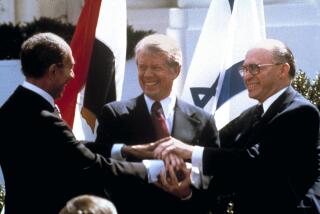MIDEAST : New Military Pact With Israel Puts Turkey on the Defensive
- Share via
ISTANBUL, Turkey — Israeli fighter pilots can soon escape the narrow confines of the Jewish state to train over the broad plains and rugged mountains of Turkey, under a trend-setting, new military cooperation agreement that has upset Muslim strategists from Cairo to Tehran.
Egyptians say it could upset the Middle East peace process and shift the balance of power in the region. Iranians say it is part of a Zionist plot. Even in Turkey, up-and-coming Islamists say that signing Israel’s first major military deal with a Muslim state is a betrayal of the Palestinians.
“Turkey has always carried the shame of being the first Muslim country to recognize Israel,” wrote Mehmet Sertpolat in the daily Milli Gazete, organ of the pro-Islamic opposition Welfare Party, now Turkey’s biggest political grouping. “For the past two years, [the government] has planned with the CIA and Mossad the erasing of political Islam from the Middle East.”
Faced with a barrage of criticism and questions, spooked by the strength of pro-Islamic factions and getting no support from the weak, month-old center-right coalition led by Prime Minister Mesut Yilmaz, the Turkish Foreign Ministry has been forced onto the defensive.
“This agreement is aimed at no third country,” spokesman Omer Akbel said, adding that Israeli planes on training missions would carry no weaponry or intelligence-gathering equipment.
A Foreign Ministry statement added: “Turkey and Israel have developed their relations in many ways since the start of the Middle East peace process. At the United Nations, we have always voted with Arab countries on the need to return the occupied territories.”
The military cooperation agreement signed in February is a substantial document in itself, including joint military training, exchanges between military academies and participation of observers in each other’s exercises.
The deal is part of a wider picture of rapidly improving relations that include a free-trade agreement and a $650-million arms contract--financed by Israeli banks with a $410-million Israeli government guarantee--to upgrade the electronic warfare capacity of the country’s F-4 Phantom warplanes.
Eitan Naeh, a spokesman for the Israeli Embassy in Turkey, put the expanding relations with Turkey in the context of an “open-ended” attempt “to create a wider camp of countries who support the peace process.”
Unlike the Arabs and Iranians, Turkey has no bilateral or ideological problems with Israel.
The government usually voices pride in good relations with its small Jewish community. On the other hand, Turkey’s relations with Syria and Iran are plagued with difficulties.
“In theory, Turkey’s policy is to be friendly to all. But, willingly or unwillingly, Turkey is being pushed into a kind of bloc,” said Sami Kohen, senior foreign affairs commentator for Turkey’s major Milliyet newspaper.
He was referring to a loose, emerging grouping of Middle East countries broadly allied with the goals of the United States and the peace process.
Egypt, well-rewarded with U.S. aid for its role in opening up relations between Arab states and Israel, has, however, reacted negatively to Turkey’s flirtation with Israel.
Officials in Cairo say it would upset the military balance that is at the heart of the 5-year-old U.S.-backed attempt to negotiate a lasting peace between Israel and the Arab states around it.
“We say to both parties, the Israeli and the Turkish, that it is not in the interest of peace or stability that some non-Arab states in the region should come and enter an alliance, or a quasi-alliance,” senior Egyptian policy-maker Osama Baz told reporters.
But the strongest reaction has come from Iran, keen to polish up its credentials as the most outspoken defender of Islamic ideals.
Iranian newspapers heaped criticism on Ankara, while Foreign Minister Ali Akbar Velayati said Tehran was closely following “news on Turkey’s military cooperation with the Zionist regime.”
Iran’s outburst of moral indignation was also timed to distract attention from Turkey’s demand Tuesday that Tehran withdraw four Iranian diplomats, named as accomplices by an Islamic hit man who confessed to killing two prominent Turkish authors in 1990 and kidnapping Iranian opposition figures.
The Tehran government hit back with a preemptive demand that Turkey withdraw four Turkish diplomats from Iran for spying and other alleged misdeeds. Turkey quickly called them home, seeking to calm things down.
More to Read
Sign up for Essential California
The most important California stories and recommendations in your inbox every morning.
You may occasionally receive promotional content from the Los Angeles Times.













